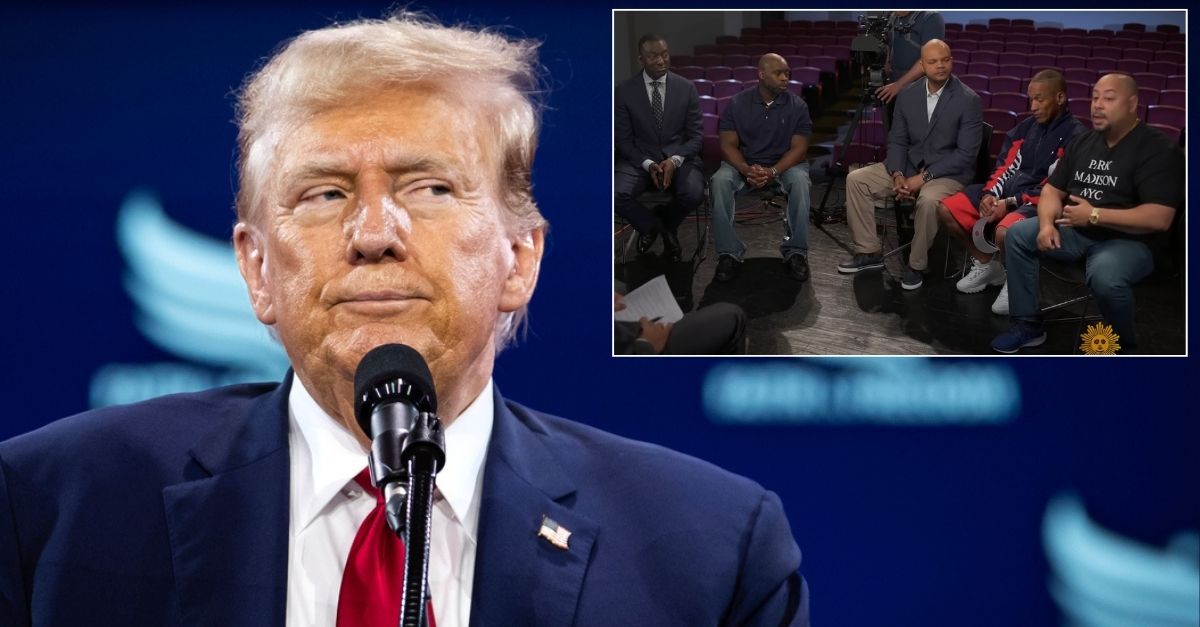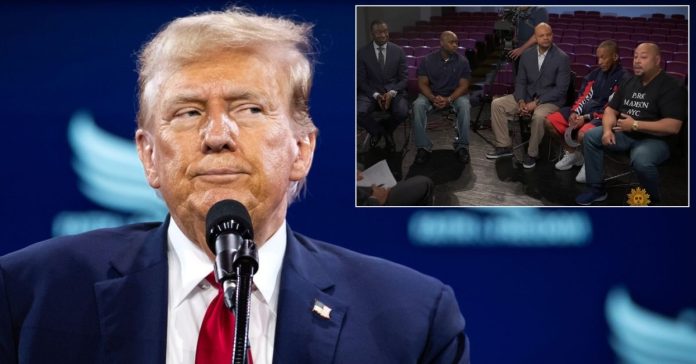
Inset, left to right: Yusef Salaam, Antron McCray, Korey Wise, Kevin Richardson, Raymond Santana appear on CBS Sunday Morning, May 12, 2019 (CBS Sunday Morning). Background: Donald Trump speaks at the annual Road to Majority conference in Washington, DC, June 22, 2024 (Allison Bailey/NurPhoto via AP).
A federal judge in Pennsylvania on Friday dealt President Donald Trump a substantial loss in his effort to fight back against a defamation lawsuit filed by the Central Park Five.
In a 13-page opinion, U.S. District Judge Wendy Beetlestone ruled the plaintiffs” claims were not barred by the Keystone State’s anti-SLAPP — or strategic lawsuit against public participation — law.
“The only issue before the Court is whether Plaintiffs’ claims for defamation, false light, and intentional infliction of emotional distress (IEED) can survive given Pennsylvania’s Uniform Public Expression Protection Act, otherwise known as its Anti-Strategic Lawsuits Against Public Participation Statute,” the opinion notes. “Pennsylvania’s Anti-SLAPP Statute (a state law) does not apply here, in federal court. Accordingly, Defendant’s Motion shall be denied.”
The ruling puts the kibosh on one of the remaining procedural protections available to the 45th and 47th president as he aims to avoid a trial over false claims that the five exonerated men formally “pled guilty” to a crime and that they “killed a person ultimately.”
On Nov. 20, 2024, Trump requested a conference in anticipation of filing a motion to dismiss based on a failure to state a claim under the federal rules and the anti-SLAPP statute. In turn, the Central Park Five’s attorneys argued Trump’s attorney incorrectly invoked the law.
The underlying lawsuit filed by Antron Brown, Kevin Richardson, Raymond Santana, Korey Wise and Yusef Salaam claims that during his lone debate with Kamala Harris, Trump “falsely stated that Plaintiffs killed an individual and pled guilty to the crime.”
In the pre-motion to dismiss requesting a conference, Trump argued that his statements constitute “non-actionable opinion, are substantially true, and lack defamatory sting.”
The plaintiffs responded by categorically rejecting the defense’s understanding of what constitutes truth – and by insisting there are simply too many arguments between the parties for anything to be determined by way of motions practice in the lawsuit.
The court, for its part, largely eschewed facts to address Trump’s motion on entirely different, narrow, and procedural grounds.
“The general rule is that federal courts sitting in diversity jurisdiction— like the Court is today—apply state substantive law, but they do not apply state procedural law,” Beetlestone explains.
The court notes there are some exceptions to the rule – but tersely dispenses with those exceptions by finding that “the analysis begins and ends with the direct collision between the Federal Rules and the Anti-SLAPP Statute.”
To hear the judge tell it, “two rules directly collide” because they “answer the same question.” That question, the judge says, is whether the amended complaint “should be dismissed.”
The court previously dismissed another version of the Central Park Five’s complaint – for failure to state a claim – essentially telling the plaintiffs they did not properly plead their case and to try again.
Now, Trump says, the case should be dismissed, in part, because of the original dismissal; in part because the language of the state and federal rules is similar. Relevant here, the anti-SLAPP statute says a person is immune from a lawsuit if the plaintiffs fail to state a claim; the federal rules in question also deal with dismissals – but are vastly different vehicles.
The court recites this logic and dismisses it out of hand:
In Defendant’s view, the prior dismissal—because of the determination that Plaintiffs had failed to state some claims—means that he is now immune from such claims by virtue of [the anti-SLAPP statute]. Defendant argues that there can be no direct collision between [the anti-SLAPP statute] and the Federal Rules, because the Section incorporates the Federal Rules’ standards. As Defendant sees it, “[i]f two rules are the same, they do not conflict,” but he does not cite any authority for that proposition—nor does he meaningfully engage with the issue of whether the Section and the Federal Rules answer the same question.
In other words, Trump argued the rules were so similar that it didn’t make a difference. Oppositely, the court found the rules mainly to be similar insofar as the question they answered. And since the case is in federal court, she applied the federal rules. Those federal rules, Beetlestone said, simply preclude application of the anti-SLAPP statute.
“Because the Federal Rules answer the same question as the Anti-SLAPP Statute, and because such Rules are valid, Section 8340.15 of Pennsylvania’s Anti-SLAPP Statute is not applicable here,” the court concluded.
In a separate, one-sentence order, Beetlestone denied Trump’s motion to dismiss.

